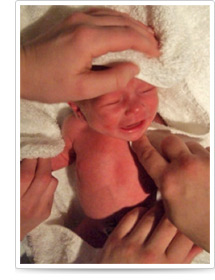 GOLD Perinatal Care Conference News
GOLD Perinatal Care Conference News
By Prof Dr Elizabeta Zisovska, PhD
Pain in newborns is very often unrecognized and undertreated, mainly because of the lack of awareness among health care providers of pain perception, assessment, and pain management in neonates. There are two crucial facts regarding newborns and pain:
- Pain is defined as “an unpleasant sensory and emotional experience associated with actual or potential tissue damage”.
- The interpretation of pain is subjective and depends on self-reporting.
 For the neonate, two kinds of non-verbal responses are very significant: Gross physical movements and physiological response measurements. The former are recognized by simple direct observation, while the latter requires specific equipment to monitor blood pressure and stress hormone levels. Because the neonates cannot express the pain they feel, they depend on others to recognize, assess and manage it for them. The cry response is increasingly important, as researchers are now able to differentiate between different kinds of cry. These two facts give way to understanding the reason for the underestimation of neonatal pain. It has been previously thought that newborns, especially premature ones, are incapable of experiencing any pain due to the immaturity of their nervous system and incomplete myelinisation; however, today it is clear that newborns indeed do feel pain, and that it is possible for others to perceive and manage neonatal pain experiences.
For the neonate, two kinds of non-verbal responses are very significant: Gross physical movements and physiological response measurements. The former are recognized by simple direct observation, while the latter requires specific equipment to monitor blood pressure and stress hormone levels. Because the neonates cannot express the pain they feel, they depend on others to recognize, assess and manage it for them. The cry response is increasingly important, as researchers are now able to differentiate between different kinds of cry. These two facts give way to understanding the reason for the underestimation of neonatal pain. It has been previously thought that newborns, especially premature ones, are incapable of experiencing any pain due to the immaturity of their nervous system and incomplete myelinisation; however, today it is clear that newborns indeed do feel pain, and that it is possible for others to perceive and manage neonatal pain experiences.
Untreated pain in the neonate gives ground for a number of metabolic and homeostatic changes including an increased requirement for oxygen, a reduction in the efficiency of gas exchange in the lungs, alteration in cerebral neuroanatomy, avoidance and alteration in response to stimuli, developmental delays, emotional disorders, and many other immediate and long-term adverse effects. Despite the clinical importance of neonatal pain, current medical practices continue to expose infants to repetitive, acute or prolonged pain experiences. Particularly in Neonatal Intensive Care Units (NICU), procedural pain is a huge, unsolved issue that, due to the need and availability of modern technology, is a continuously growing problem.
“Even if not expressed as conscious memory, memories of pain may be recorded biologically and alter brain development and subsequent behavior”. Prior to treatment, the newborn must be properly assessed for any pain that is experienced. Management of pain in the neonate includes environmental, behavioral and pharmacological interventions, with the same end-goal: to alleviate, reduce, and in the best scenario eliminate, the experience of pain. Therefore, within clinical settings for neonatal care, written, evidence-based Clinical Guidelines for pain management should be developed, in order to improve the overall successful development of each individual. Healthy and happy children are the wealth of each society.
Dr. Elizabeta Zisovska is presenting Assessment and Management of Procedural Pain in Neonates at GOLD Perinatal Care Online Conference this coming November.




